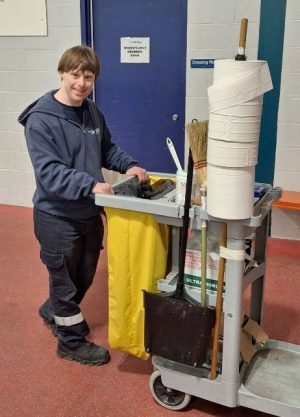Tip-Top Tips from Workers with Down Syndrome and their Employers
Tip-Top Tips from Workers with Down Syndrome and their Employers
Note: This article is written in plain language.
Pour la version française de cet article, veuillez cliquer ici. | For the French version of this post, please click here.
Many employers hire workers with Down syndrome. With help from the Canadian Down Syndrome Society, we asked two persons with Down syndrome and their employers to share their thoughts.
They told us about the strengths of workers with Down syndrome. They also mentioned how persons with Down syndrome can be supported at work.

Jessica
Jessica is a Path Forward Classroom Assistant for a preschool.
It’s the preschool she attended when she was younger. She loves working at her preschool!
She knows so many people and loves her co-workers. She really enjoys being around the children and meeting new children.
One of Jessica’s wishes is to work more hours so she can make more money.
Jessica told us about her tasks at work:
“
At my job I put the toys away when the children are done with them.
I set up the sensory tables and put them away when the children are done.
I set up the snack tables and clean them up. I fold laundry and put it away.
I set out the chairs for the music circle. I also do whatever the teachers ask me to do.
Some of the strengths Jessica says she brings to her job are:
- Being a hard worker.
- Being friendly and a people-person.
- Following the rules.
- Dressing professionally.
- Being on time (unless Wheel-Trans, the para-transit service, makes her late).
Jessica’s Tip-Top Tips:
I am fun to work with.
I am committed to my career.
I love people.
I love getting paid for the work I do.
Jason – Jessica’s Employer at the Preschool
When asked about Jessica, Jason mentioned that Jessica is very reliable.
She is organized and pays great attention to detail. If something is out of place or gets forgotten, she’s the first to notice.
Jessica often knows the schedule better than the teachers. She is always in the right place at the right time.
Jason shared some supports that help Jessica and her colleagues:
“
Depending on the level of support needed, we offer visual schedules and checklists, along with verbal reminders when necessary. Most of our employees are very long-term and know their positions very well.
With newer employees we offer training and a staggered start, introducing new tasks over time. This allows time to process and master each task.
Jason’s Tip-Top Tips:
- Ask the employee what supports and learning style works best for them.
- Keep schedules and checklists clear and straightforward. Visual schedules are handy, especially in busy environments.
- If a task has specific steps, using pictures helps. For example, if a snack must be set up a certain way.
- Focus on the employees’ strengths.
- Verbal reminders and discussions around improvement should address the task, not the individual. And for all employees, point out a job well done. Saying “Thank you” goes a long way.
- Problem-solve with the employee. For example, if a storage shelf is too high, do they feel safe on a step stool? Would it be better to use a different shelf? Working out these problems together promotes a sense of ownership. It opens communication and usually results in the best solution.
- Take the time to do the initial training properly. Setting expectations right off the bat will help build confidence, setting everyone involved up for success.
Matthew
Matthew has two jobs.
He is a Caretaker for the City of Windsor. He likes working on a team with other people. He also likes working by himself.
Matthew also works as a Clinical Assistant at a physiotherapy clinic. He loves chatting with patients and his co-workers. His bosses are easy to work for and are kind.
Matthew told us about his tasks at work:
“
(For the City of Windsor) Cleaning and maintenance at a City Arena.
(At the physiotherapy clinic) Laundry, helping my team with anything they need, restocking, cleaning – like vacuuming.
Some of the strengths Matthew says he brings to his job are:
- Being proud of himself because he can get things done.
- He can follow directions from his boss.
- Working helps him stay healthy.
- He is willing to learn new tasks.
Matthew’s Tip-Top Tips:
Be confident.
Be creative.
Try new things.
Julie – Matthew’s Employer at the City of Windsor
Julie was happy to share that Matthew is dedicated to his job. He can complete his assigned tasks independently.
They can always depend on Matthew to complete high caliber work.
He also gets along with his co-workers, his supervisors, and the members of the public each workday.
Julie shared some supports that help Matthew and his colleagues:
“
We have provided Matthew with shorter shifts, specifically 6.5-hour shifts, two days per week, rather than an 8-hour shift, 40 hours per week.
Matthew works with a partner at the site and stays on track by following a task list.
Julie’s Tip-Top Tips:
For Employers
- Be open to the experience and don’t sell someone short before giving them an opportunity to prove themselves.
- The City of Windsor has Business Partners available who can talk with job seekers who may not know exactly where their job skills or interests will fit. Job seekers can contact a Business Partner to discuss the type of work environment that suits their skill set, their interests, and where they see themselves.
For Workers with Down Syndrome
- Tell the employer of any accommodation you might need. You can tell them when you’re looking for a job or during an interview. You can also tell them when you’re offered a job.
- If it helps, bring a support person with you for discussions that are online or in person. They can help explain all the forms you have to fill. They can help you with parts that might be challenging.
- The City of Windsor has Business Partners who can talk to you. A Business Partner can talk to you about your skills and interests. They can talk to you about the work you want to do.

Photo above: Matthew working at the arena.
Troy – Matthew’s Employer at the Physiotherapy Clinic
We asked Troy to share some thoughts about Matthew. He said that Matthew’s most obvious traits are being reliable and hardworking.
Any task that Matthew is asked to do is done with focus, attention to detail, and effort.
Matthew’s attendance is excellent. He is always on time. Most of the time he is early!
Matthew works hard up to the very end of his shift.
Matthew is a very valuable part of their team. He understands his role in helping other teammates when needed.
He is also an excellent communicator with fellow staff and patients.
Troy shared some supports that help Matthew and his colleagues:

Photo above: Matthew working at the physiotherapy clinic.
“
Open communication is the most obvious form of support we offer Matt and all our staff to help each other succeed.
If Matt needs to modify a shift (hours or day), usually to accommodate other jobs or sports he has in the community, then it is a simple modification to our teams’ hours.
Troy’s Tip-Top Tips:
- From my experience working almost 18 years with Matt, clear and concise instructions for a task are most important.
- The tasks assigned are done very well. Every assigned task is completed with near perfection.
- Leading by example is very important. Other staff with the same tasks can be role models. Outline the tasks each staff is doing every day.
- Routine is key!
- We are professional, but we still have fun and enjoy the day!
A big shout out and thank you to Jessica, Jason, Matthew, Julie, and Troy, and to the Canadian Down Syndrome Society!
Additional Resources for Workers and Employers
- Canadian Down Syndrome Society’s Employment Planning Hub and Position Statements on Supported Employment and Preferred Language
- Canadian Down Syndrome Society and LinkedIn – Inployable Guide for Employers
- Dollars and Sense: Why Hiring People with Down Syndrome is Good for Business – article by Mark Wafer, MSC OMC, past Tim Hortons franchisee
Share this post!

